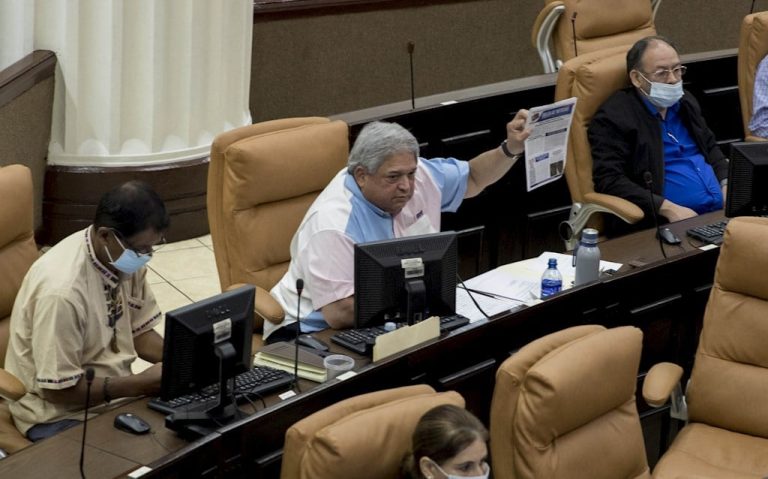12 de febrero 2021

The Return of the Military

PUBLICIDAD 1M
PUBLICIDAD 4D
PUBLICIDAD 5D
Uncertainty increases for banks, who are awaiting the regulations that would be published in the coming weeks.

Deputy Byron Jerez. Photo: EFE
The “Law for the Protection of Consumers and Users” entered into force on February 9, after its publication in the official Gazette. The Ortega majority of the National Assembly ignored the warning of private banks, the private sector and specialists about the impact on the national financial system and the economy. Now, the regulations are expected to be published in the coming weeks.
The reforms were approved expeditiously and without major changes to the Executive’s proposal, with 74 votes in favor, 14 against and one abstention.
With the law’s entering into force, uncertainty increases among the financial sector. They fear a collapse of economic activities if any of the 28 officials sanctioned by the United States (including some also by the European Union, Canada and Switzerland) try to reopen their accounts.
The law requires financial institutions to notify users about the causes of cancellation of their accounts. Reasons must have national legislation as their base. At the same time, it allows those affected to appeal to regulatory agencies.
In addition, the law defines the State of Nicaragua as one more consumer. This would allow it to sue if some State entity is refused service. (There are state entities under sanctions such as the National Police).
On February 8, the Sandinista legislator Walmaro Gutierrez, promoter of the Law to Regulate Foreign Agents, assured on TV, “it makes me laugh when they tell me that this is a law to support 27 people (actually there are 28, including him), who were sanctioned. This is absurd. We are talking about an initiative that is focused on guaranteeing the right of consumers and users to 6.3 million Nicaraguans who live in this country.”
Economist Nestor Avendano explained during the “Esta Semana” program that it will be difficult for those sanctioned to reopen their accounts in the country’s financial institutions.
“The issue of those sanctioned is a very particular interpretation of the banks. This, because a foreign law conditions them not to carry out any financial transaction with those sanctioned. The government knows this very well. So if it pushes ahead, the international financial transactions of the banks based in Nicaragua with the rest of the world will collapse,” Avendano explained.
If this happens, the bankers fear the correspondent banks they use will close to them. This means that they will not be able to carry out procedures on behalf of a Nicaraguan bank, for example, which does not have presence in other countries.
But not everything has been said about this law yet. Different bankers consulted by Confidencial, said they are waiting for it to be signed by Ortega, who could backtrack. They also await the publishing of the regulations needed to apply the law in the coming weeks.
“If they demand the opening of an account for a sanctioned person, we will be left out of the financial system. Now, the wife of a drug trafficker can come to the country to open an account. Before, the banks simply would not allow it,” explained the former president of the Superior Council of Private Enterprise (Cosep), Jose Adan Aguerri.
Economist Nestor Avendano warned that, although the sanctions are against specific people, on many occasions the banks themselves extend these to the families of those affected.
“(The sanctions) only mention the person sanctioned for violation of human rights or corruption, but in practice, the banks applied that sanction to all his/her relatives, and that is wrong,” explained Avendano.
This point was discussed in plenary last February 3rd by deputy Byron Jerez. He expressed: “Let no member of the PLC caucus be sanctioned, because then they will experience firsthand what they are voting today. When they close the account of the sanctioned person and his wife, his children, his mother-in-law, etc.”
In this regard, the sanctions of the US Treasury Department can affect the families of those sanctioned, a US official told Confidencial. These can be extended to children or spouses to prevent the Global Magnitsky Law from being violated, for example.
Now, the banks will have to notify people that their account will be closed and give arguments based on the Law. If any of these people do not agree with the decision, then they can appeal to the regulatory agencies, in this case the Central Bank of Nicaragua.
Archivado como:
PUBLICIDAD 3M
PUBLICIDAD 3D